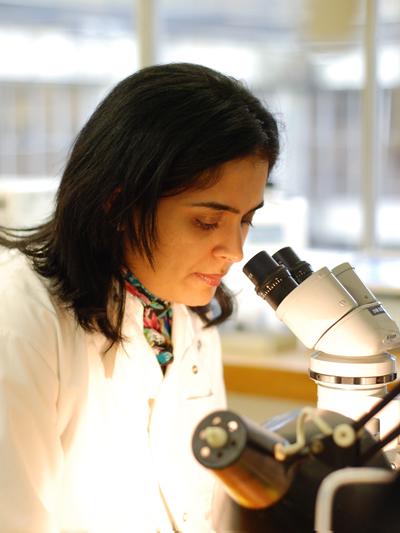Research interests
The overarching aim of our research is to investigate the mechanisms that underpin tau-mediated dysfunction and degeneration in tauopathies such as Alzheimer’s disease and fronto-temporal dementia (see Mudher et al 2004, Mol Psychiatry, Cowan et al 2020 Acta Neuropathologica for early investigations). More recently these studies include projects to investigate propagation of tau pathology
in vivo
in
Drosophila
. Some of this work led to identification of disease-modifying tau-centred therapeutic targets (See Quriase et al 2013 Mol. Psychiatry). It has also raised interesting questions about the pathological significance of established tau aggregates such as soluble forms of tau, tau oligomers and tau filaments. More recently we are assessing whether tau-mediated axonal degeneration is wallerian in nature.
A related project investigates the cross talk between type-2 diabetes and Alzheimer’s disease. Using transgenic models and human tissue, the impact of an insulin resistant on tau phosphorylation and aggregation state are investigated. This will shed light on the mechanisms that underpin the cross talk between these two co-morbidities.
Another branch of research focuses on understanding how the neuronal cytoskeleton as well as cellular processes implicated in tau turnover, such as autophagic/proteosomal clearance, change with age. In parallel we seek to investigate how these changes contribute to development of Alzhiemer’s disease by studying their interaction with both tau and amyloid pathologies and phenotypes.
A major research area is a set of inter-disciplinary projects that utilise biophysical methodologies to study tau aggregation. Using label-free techniques such as AFM, Raman spectroscopic techniques and DLS, these projects aim to interrogate and characterise tau aggregates formed
in vitro
, in transgenic fly and mouse models of tauopathy as well as in brains of tauopathy patients. By generating unique spectral signatures for various disease associated forms of these proteins, we hope to use this technology to probe biological fluids for biomarkers of early disease.
Key current research projects include:
a) Understanding the mechanisms underpinning tau mediated neuronal dysfunction and degeneration in tauopathies such as Alzheimer’s disease (Granular tau oligomer project/Dr.
Catherine Cowan
and Wallerian degeneration in tauopathies project/
Katy Stubbs
in collaboration with Prof. VH Perry).
b) Identifying disease-modifying tau-centred therapeutic targets (NAP project/Dr. Shmma Quraishe – see Quraishe et al Mol. Psychiatry 2013).
c) Unravelling mechanisms that underpin cross talk between tau and Abeta peptide in Alzheimer’s disease (protein aging project Dr. Louisa Moro in collaboration with
Dr. Delphine Boche
)
d) Understanding the mechanisms by which aging processes contribute to neurodegenerative diseases like Alzheimer’s disease (Aging project/Megan Sealey in collaboration with
Dr. Delphine Boche
and Prof. Chris Proud).
e) Using the unique structural attributes of misfolded proteins to develop label-free biomarkers (Spectral signature project/Kelly Howard in collaboration with
Dr. Sumeet Mahajan
)
Developing novel Drosophila models of asthma to investigate role played by genome wide association loci (pilot project in collaboration with
Prof. Donna Davies
,
Dr. Jane Collins
,
Dr. Hans M Haitchi
and Prof. Thomas Roeder).
Research group
Neuroscience
Affiliate research groups
Molecular and Cellular Biosciences
,
Southampton Neuroscience Group (SoNG)
,
Institute for Life Sciences (IfLS)
,
iDeAC
Research project(s)
Use of Drosophila Models to Explore the Function of Asthma Susceptibility Genes
Using Drosophila models to replace, augment and inform vertebrate asthma models by allowing first-pass elucidation of key asthma genes, and providing an in vivo model for rapid high through-put drug screening.
An integrated approach to CNS inflammation: cooperation between antibodies and CD8 T cells
Microtubule destabilisation is believed to be a key mechanism by which phosphorylated tau causes dysfunction in tauopathies. In Alzheimer’s disease Abeta peptide toxicity is mediated by phosphorylated tau. This PhD project investigates whether microtubule destabilisation underpins this tau-Abeta interaction.
Unravelling the role of microtubule stabilisation in the pathogenesis of Alzheimer’s disease
Microtubule destabilisation is believed to be a key mechanism by which phosphorylated tau causes dysfunction in tauopathies. In Alzheimer’s disease Abeta peptide toxicity is mediated by phosphorylated tau. This PhD project investigates whether microtubule destabilisation underpins this tau-Abeta interaction.
Label-free spectroscopy for diagnosing and monitoring AD
Spectral signatures for disease-associated protein aggregates.
Protein misfolding and the neuroprotective role of molecular chaperones
Molecular chaperones such as heat shock proteins (HSPs) regulate protein folding, misfolding, protein degradation and signalling pathways involved in neuronal death and survival.
Knowing exactly how the nervous system degenerates and becomes more vulnerable with age would further our understanding of how ageing occurs and how to prevent the debilitating neurological effects of ageing.
Professor Amritpal Mudher
School of Biological Sciences
Faculty of Environmental and Life Sciences
Life Sciences Building 85
University of Southampton
Highfield Campus
Southampton
SO17 1BJ
Room Number :
85/3057
Professor Amritpal Mudher's
personal home page
